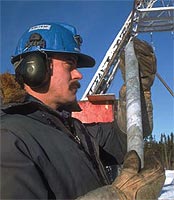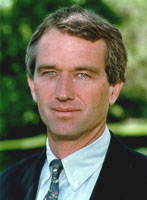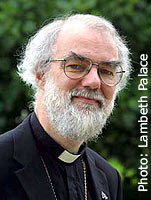
News |
- Great Lakes Water Diversion Agreement Proposed
- Scientists Appeal to Rescue Climate Research
- Sierra Club Evaluates East Side Planning
- Mining Council Supports World Heritage Sites
- Work Permit Issued For Wuskwatim Site
- Robert Kennedy Jr. Calls for Protection of Manitoba's Boreal Forests
- Canada to Trade Emissions
- Climate Change Risks Future of Snowshoe Hare
- ME3 Opposes US Transmission Line for Manitoba Hydro Exports
- Archbishop Says Climate Change Global Crisis
- Western Governors Launch 'Clean' Energy Initiative
- Canada's National Parks Create 38,000 Jobs
Great Lakes Water Diversion Agreement Proposed |
18 August 04 |
 Ontario, Quebec and all eight states that border the Great Lakes have released
a draft version of a long-awaited Great Lakes Annex 2001 Implementing Agreements to manage water use and limit water diversion from the Great Lakes Basin.
Ontario, Quebec and all eight states that border the Great Lakes have released
a draft version of a long-awaited Great Lakes Annex 2001 Implementing Agreements to manage water use and limit water diversion from the Great Lakes Basin. The proposed agreement would prevent bulk movement of water by requiring the unanimous consent of the states and provinces for large diversions. It would, however, allow for the borrowing of water from the five Great Lakes to areas in the region that are outside the basin, but prevent it from heading to other areas, such as the U.S. southwest. (Borrowed water must be cleaned and to the system.) Critics of the Annex have stated that the process of developing the pact has been driven by political agendas and the fear of legal challenges rather than a desire for a broad environmental management plan. In addition, the Annex will only apply to new withdrawals, raising concerns that the pact will do little to protect an ecosystem already in jeopardy. Public hearings will be held over the next 90 days in Canada and the United States. The agreement then needs to become law on both sides of the border. If the new Great Lakes Charter Annex becomes law, it will be a binding agreement among the governments in Canadian provinces and US states. The significance of this is that if a state violates the new law, the provinces will have standing in U.S. courts. View the Council of Canadians Press Release View the CBC Online news story Visit the International Joint Commission Web Site Sources: CBC Online News, Council of Canadians
|
|
Scientists Appeal to Rescue Climate Research |
18 August 04 |
 Twenty-one top government and university scientists released a report June 16, 2004, cautioning that continuing funding cuts to the Meteorological Service of Canada (MSC) threaten Canadian capacity for research on reducing smog and climate change, and improving the accuracy of severe weather forecasts. The service's research funding dropped nearly 30 per cent between 1994 and 1998, there are fewer meteorologists working at Environment Canada's weather office, and much of the equipment is out of date.
Twenty-one top government and university scientists released a report June 16, 2004, cautioning that continuing funding cuts to the Meteorological Service of Canada (MSC) threaten Canadian capacity for research on reducing smog and climate change, and improving the accuracy of severe weather forecasts. The service's research funding dropped nearly 30 per cent between 1994 and 1998, there are fewer meteorologists working at Environment Canada's weather office, and much of the equipment is out of date.The grave concern about the future of atmospheric and climate science is underlined by the presence of 10 current researchers (plus one recent retiree) from the MSC among the 21 experts who signed the unprecedented public appeal. Ten professors signed an open letter in the report and added additional support to the appeal by stating that their institutions can't replace the weather office's backbone of services; only government can supply national monitoring networks and long-term programs. MSC research provides the scientific basis for action on climate change, air pollution and ozone depletion as well as new techniques to improve weather forecasting. View the scientists' report Beyond the Breaking Point View the CBC News Online article View the Toronto Star article Sources: CBC News Online, Toronto Star
|
|
Sierra Club Evaluates East Side Planning |
29 July 04 |
 Land-use planning that fulfills National Forest Strategy goals will become increasingly important in Canada's northern boreal forests, according to a report released July 29, 2004 by the Sierra Club of Canada. The report compares land-use planning processes in B.C. (Muskwa-Kechika), Ontario (Lands for Life), Saskatchewan (Athabasca) and Manitoba (East Side Planning Initiative). The comparison and case studies are based on the National Forest Strategy commitment to undertake land use planning as part of an ecosystem-based approach to forest management.
Land-use planning that fulfills National Forest Strategy goals will become increasingly important in Canada's northern boreal forests, according to a report released July 29, 2004 by the Sierra Club of Canada. The report compares land-use planning processes in B.C. (Muskwa-Kechika), Ontario (Lands for Life), Saskatchewan (Athabasca) and Manitoba (East Side Planning Initiative). The comparison and case studies are based on the National Forest Strategy commitment to undertake land use planning as part of an ecosystem-based approach to forest management. The report's release coincides with work on a draft East Side (of Lake Winnipeg) Planning Initiative (ESPI) report that will be submitted to Manitoba's Minister of Conservation. "We are quite concerned that the draft report from two-and-a-half years of work has not resulted in the start of land use planning or action on the goals for the East Side" said Gaile Whelan Enns, Director of Manitoba Wildlands. "No planning has actually occurred, and the risk of 'development-only' planning has resurfaced. Manitoba needs to confirm the original stated intent of the ESPI, and support communities who are anxious to undertake local planning studies. What we have seen to date of the draft report indicates that some of the recommendations are in contradiction to the ESPI terms of reference, and that outright confusion exists regarding public policy in Manitoba." View the Full Sierra Club of Canada Release View the Sierra Club of Canada report View the Manitoba case study (PDF) View the Executive Summary (PDF) View the National Forest Strategy and Accord Source: Sierra Club of Canada
|
|
Mining Council Supports World Heritage Sites |
27 July 04 |
 The International Council on Mining and Metals (ICMM) signed a Memorandum of Understanding with the World Conservation Union (IUCN) on July 20, 2004, to engage in a dialogue with the objective of improving the performance of mining industries in the area of biodiversity conservation and increasing mutual awareness between mining industries and the conservation community. The MOU is an attempt for formalize a relationship and dialogue that has been steadily growing, stimulates by events such as the 2002 World Summit on Sustainable Development.
The International Council on Mining and Metals (ICMM) signed a Memorandum of Understanding with the World Conservation Union (IUCN) on July 20, 2004, to engage in a dialogue with the objective of improving the performance of mining industries in the area of biodiversity conservation and increasing mutual awareness between mining industries and the conservation community. The MOU is an attempt for formalize a relationship and dialogue that has been steadily growing, stimulates by events such as the 2002 World Summit on Sustainable Development.The signing of the MOU follows on the August 2003 announcement that ICMM members would not explore or mine in World Heritage properties and would take all possible steps to ensure that operations are not incompatible with the outstanding universal values of World Heritage properties. View the ICMM announcement on the MOU with IUCN, July 2004 View the IUCN - ICMM Memorandum of Understanding, July 2004 View the August 2003 ICMM press release regarding World Heritage Sites View the ICMM commitment regarding biodiversity |
|
Work Permit Issued For Wuskwatim Site |
20 July 04 |
 Reports that Manitoba Hydro has begun site preparation for the Wuskwatim dam, before getting environmental approval for the project, have been reported by Nelson House Justice Seekers to the Boreal Forest Network (BFN).
Reports that Manitoba Hydro has begun site preparation for the Wuskwatim dam, before getting environmental approval for the project, have been reported by Nelson House Justice Seekers to the Boreal Forest Network (BFN).A work permit has been issued, for Hydrometric Field Work, to Manitoba Hydro by Manitoba Conservation District Office in Thompson. Requests to see the permit were denied, and staff indicated that a Freedom of Information Request needed to be completed in order to obtain a copy of the Work Permit. Wojcznski, of Manitoba Hydro, is clearly on record (July 28, 2003, page. 105) in the Clean Environment Commission pre hearing conference transcripts, saying that "Manitoba Hydro would not proceed with site preparation work before the process had been completed." View the full Boreal Forest Network Press Release Source: Boreal Forest Network, Nelson House Justice Seekers
|
|
Robert Kennedy Jr. Calls for Protection of Manitoba's Boreal Forests |
15 July 04 |
 The July 15, 2004 issue of the Winnipeg Free Press includes two articles featuring Robert Kennedy Jr., Senior Attorney for the Natural Resources Defense Council and son of Senator Robert Kennedy.
The July 15, 2004 issue of the Winnipeg Free Press includes two articles featuring Robert Kennedy Jr., Senior Attorney for the Natural Resources Defense Council and son of Senator Robert Kennedy.Mr. Kennedy, a long-time advocate for the environment, is interviewed by Alexandra Paul ('Kennedy Calls for Halt to Hydro Dam Projects - Robert Jr. Urges Protection of Manitoba's Forests') about his recent visit to two First Nation communities in northern Manitoba and his interest in promoting the protection of Manitoba's spectacular boreal forests. "Aboriginal people and other people who live close to the land recognize that there are other values in the wilderness that can't be measured in money," he said. An opinion piece authored by Mr. Kennedy appears in the same edition of the Free Press ('Hydro is Breaking Our Hearts'). Mr. Kennedy offers his perspective on the ongoing damage caused by past Hydro developments, and the need for First Nations to have the authority to make decisions about their traditional lands. Download the July 15, 2004 Winnipeg Free Press article Download the July 15, 2004 Winnipeg Free Press editorial column Visit the Natural Resources Defense Council 'Heart of the Boreal' BioGem web site Visit the Poplar River First Nation web site Source: Winnipeg Free Press
|
|
Canada to Trade Emissions |
27 July 04 |
 Canada appears to be following in the footsteps of the European Union, which is in the midst of establishing an Emissions Trading System that would allow companies to make a profit by selling surplus carbon credits on an exchange if they are below the target for greenhouse gas emissions. Companies that exceed the target will have two choices. They can buy carbon credits on the market or install technology and conservation measures (like turning off the lights) to get them below the target.
Canada appears to be following in the footsteps of the European Union, which is in the midst of establishing an Emissions Trading System that would allow companies to make a profit by selling surplus carbon credits on an exchange if they are below the target for greenhouse gas emissions. Companies that exceed the target will have two choices. They can buy carbon credits on the market or install technology and conservation measures (like turning off the lights) to get them below the target. [To date Canada does not make emissions information public and has not made inter-governmental emission agreements public.] View the full Globe and Mail article Source: The Globe and Mail
|
|
Climate Change Risks Future of Snowshoe Hare |
19 July 04 |
 New research from the University of Alberta suggests that snow quality may affect the Canadian lynx's ability to kill its prey. The University of Alberta's Dr. Stan Boutin is part of a research team studying the relationship between the lynx and the snowshoe hare - an interaction that has grave implications on the dynamics of the boreal forest. The predator-prey relationship between lynx and hare is a system that typically follows a 10 year cycle, characterized by the rise and fall of the hare population according to predation by the lynx.
New research from the University of Alberta suggests that snow quality may affect the Canadian lynx's ability to kill its prey. The University of Alberta's Dr. Stan Boutin is part of a research team studying the relationship between the lynx and the snowshoe hare - an interaction that has grave implications on the dynamics of the boreal forest. The predator-prey relationship between lynx and hare is a system that typically follows a 10 year cycle, characterized by the rise and fall of the hare population according to predation by the lynx.In a paper published July 6, 2004, in the Proceedings of the National Academy of Science, the research team demonstrated that surface hardness, as determined by the frequency of warm winter spells, controls how deep the lynx sinks in the snow. Cold weather means snow remains fluffy and the lynx sinks deep, whereas its main prey, the snowshoe hare does not sink in the snow and will easily escape under such conditions. But with increasing warm spells, the hares are not able to escape as easily. This means that changes to the climate could potentially disrupt the relationship between these two species if there are warm spells, and a crusting of the snow occurs without long, deep cold spells. The hare is the prime herbivore in the boreal ecosystem and its disappearance would have major implications for other species, as well as the structure of the plant community. View the full University of Alberta article Source: University of Alberta
|
|
ME3 Opposes US Transmission Line for Manitoba Hydro Exports |
19 July 04 |
 As part of its JustEnergy program, Minnesotans for and Energy-Efficient Economy (ME3) is asking citizens in Minnesota to support the complaint against the construction of the Arrowhead-Weston transmission line. The complaint maintains that the owners of the transmission line can not use a special exemption permit (which would exempt it from environmental review processes) held by Minnesota Power because the line will ultimately be owned an operated by another company, the American Transmission Company.
As part of its JustEnergy program, Minnesotans for and Energy-Efficient Economy (ME3) is asking citizens in Minnesota to support the complaint against the construction of the Arrowhead-Weston transmission line. The complaint maintains that the owners of the transmission line can not use a special exemption permit (which would exempt it from environmental review processes) held by Minnesota Power because the line will ultimately be owned an operated by another company, the American Transmission Company.ME3 is opposing the construction of this transmission line because it would allow Manitoba Hydro to increase exports to new US markets, and ME3 maintains that Manitoba Hydro generates hydroelectricity at the expense of Minnesota renewable energy development, and to the detriment of people and the environment in northern Manitoba. The alternative energy advocacy group also opposes the project because they argue that it forces Minnesota farmers to give up their land, and it is already facing massive cost overruns, in the hundreds of millions of dollars, that will be passed along to ratepayers. Visit the JustEnergy Action Centre, official complaint, and news coverage of this issue |
|
Archbishop Says Climate Change Global Crisis |
15 July 04 |
 The Archbishop of Canterbury, England, Dr Rowan Williams, has championed far reaching new environmental initiatives in order to avert a global ecological crisis that could ultimately put "our viability as a species" at stake. Dr. Williams went on to state that "offences against our environment" threaten the world with further wars and rising inequality.
The Archbishop of Canterbury, England, Dr Rowan Williams, has championed far reaching new environmental initiatives in order to avert a global ecological crisis that could ultimately put "our viability as a species" at stake. Dr. Williams went on to state that "offences against our environment" threaten the world with further wars and rising inequality.In his first "green" speech as archbishop, Dr Williams adopted the approach of the Eastern Orthodox Church that destroying the environment was a sin, and that Christians had a duty to protect it. He also warned that damage being inflicted on the planet was "making the human future more and more precarious". In a lecture entitled "Changing the myths we live by", delivered before an invited audience at Lambeth Palace, Dr Williams appealed for "a new level of public seriousness about environmental issues". He referred to developed countries' divided consciousness, being "scientifically aware of but apparently practically blind to issues such as soil degradation, deforestation and a disrupted food chain." Dr. Williams went on to remind the audience that "[t]he great advances in corporate social responsibility in the business world, welcome as they are, will not of themselves undo the damage caused by our myths of limitless resource and trust in technology to solve problems." Dr. Williams supported the plan by the Global Commons Institute for fair shares of fossil fuel use between countries known as "contraction and convergence". This involves every person on the planet having an equal right and quota to emit carbon dioxide. View the full Guardian Unlimited article View the press release by the Archbishop of Canterbury View the July 5, 2004 speech by Archbishop of Canterbury, "Changing the Myths We Live By" Sources: Guardian Unlimited, Archbishop of Canterbury
|
|
Western Governors Launch 'Clean' Energy Initiative |
15 July 04 |
 Members of the Western Governors Association (WGA) led by the Governor of New Mexico and the Governor of California, launched an initiative on June 22, 2004 to develop "a clean, secure and diversified energy system for the West and to capitalize on the region's immense energy resources."
Members of the Western Governors Association (WGA) led by the Governor of New Mexico and the Governor of California, launched an initiative on June 22, 2004 to develop "a clean, secure and diversified energy system for the West and to capitalize on the region's immense energy resources."The Governors agreed to examine the feasibility and actions required to reach a goal of 30,000 megawatts of clean energy by 2015 and a 20 percent improvement in energy efficiency by 2020. A working group will be formed to determine how to reach that goal, and at the same time, ensure the region has the necessary generation and transmission capacity. The group will have balanced representation that includes state, local and Native American leaders; environmental organizations; state and tribal air quality agencies; the private sector; federal agencies; and representatives from Mexico and Canada. Some provinces in Canada, such as Ontario, PEI and New Brunswick, have launched similar initiatives committing to the development of a Renewable Energy Strategy or a Renewable Portfolio Standard with specific targets and timelines. About one third of US states currently have regulatory Renewable Portfolio Standards (RPF) with targets and timelines built in. Hydro generation energy rarely fits the definitions of renewable energy in these RPF initiatives. Manitoba does not yet have an equivalent initiative. View the Western Governors Association press release View the Policy Resolution 04-15 on Clean and Diversified Energy Initiative for the West Visit the Western Governors Association web site View the Canadian Wind Energy Association web site for information regarding Canadian initiatives. Source: Western Governors Association
|
|
Canada's National Parks Create 38,000 Jobs |
12 July 04 |
 In Canada, national parks and national historic sites contribute 1.2 billion Canadian dollars and 38,000 jobs to the Canadian economy. 28 million people visit the 41 Canadian National Parks every year. July 17th is the annual Canada's Parks Day celebrations in all national parks. The yearly pattern in Canadian polls and surveys shows that over 80% of Canadians support completion of protected areas networks, especially in our boreal forest regions.
In Canada, national parks and national historic sites contribute 1.2 billion Canadian dollars and 38,000 jobs to the Canadian economy. 28 million people visit the 41 Canadian National Parks every year. July 17th is the annual Canada's Parks Day celebrations in all national parks. The yearly pattern in Canadian polls and surveys shows that over 80% of Canadians support completion of protected areas networks, especially in our boreal forest regions.The 5th World Protected Areas Leadership Forum, co-hosted by IUCN's World Commission on Protected Areas and the Finnish Natural Heritage Services took place in Finland, June 14-15, 2004. 25 CEOs of the world's leading protected area agencies gathered at this meeting in order to network, exchange information and support capacity building for protected area management, based on conservation goals worldwide. View the full news item at the IUCN World Commission on Protected Areas web site View the 5th World Protected Areas Leadership Forum web site Visit Parks Canada Visit Parks Canada Day web site Source: World Commission on Protected Areas
|
|


 RSS Feeds:
RSS Feeds: